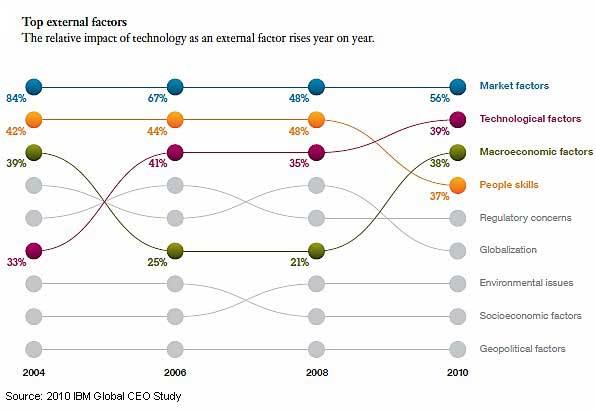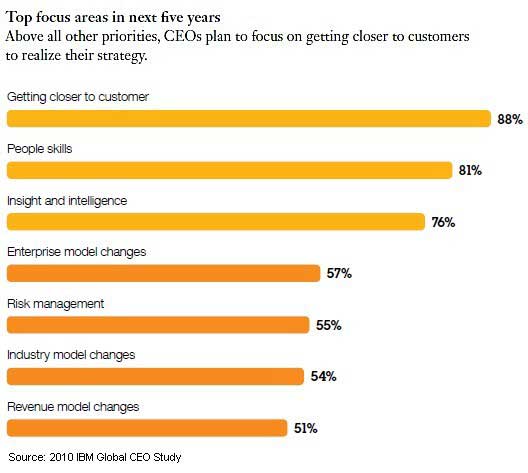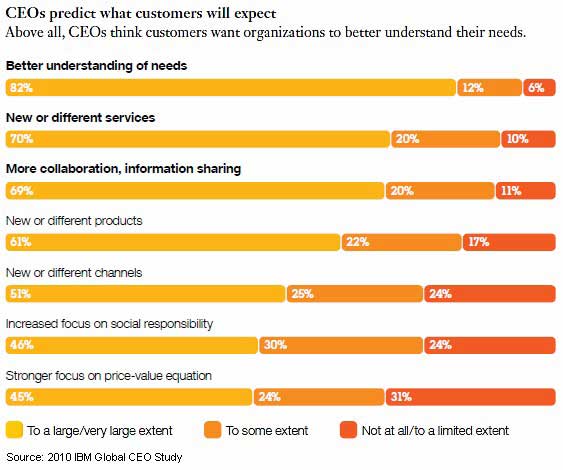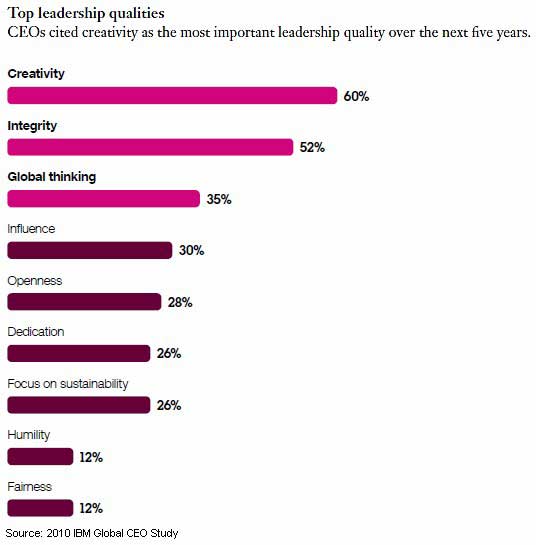Many CEOs are doubtful their companies can handle a volatile, increasingly complex business environment: 79% expect high or very high levels of business complexity over the next five years, and only 49% say their organizations are fully prepared to deal with that increased complexity, according to a study by IBM.
To cope with those changing business realities, most CEOs plan to focus both on developing new revenue sources and stronger customer relationships over the next five years.
Below, other findings from the biennial IBM Global CEO Study, based on interviews with 1,541 CEOs, general managers, and senior public-sector leaders from 60 countries and 33 industries.
Impact of Technology on Business
Asked to name the three external forces that will have the biggest impact on their organizations in the next five years, 56% of surveyed CEOs cite market factors—which has consistently topped the list since 2004.
However, this year, technological factors has risen in relative importance and now holds second place (39%), followed by macroeconomic factors (38%) and people skills (37%).

The complexity of an interconnected world is exacerbated by other factors, including increased competition: 65% of surveyed CEOs foresee a shift of economic power to rapidly developing markets, and 70% say they must double revenue from new sources in the next five years.
Rethinking Customer Relationships
Above other business priorities, CEOs want to reignite customer interest and loyalty: 88% say getting closer to the customer is the most important dimension to realize their strategy in the next five years.

Business leaders are convinced they must not only stay connected (or reconnect) with customers but also continue to learn how to strengthen those bonds—using Web, interactive, and social media channels to reengage with customers.
Some 81% of CEOs also cite acquiring the right people as a top focus, while 76% cite gathering insight and market intelligence.
Customer Expectations: Collaborate, 'Co-Create'
Asked how their customers' expectations of them would changes in the next five years, 82% of CEOs expect customers will demand a better understanding of their needs, while 70% say customers will demand new and different services.
Some 69% of CEOs say customers will expect more collaboration and information sharing—a priority driven largely by social networking, which has exponentially increased the degree of interaction customers expect of organizations.

Looking for great digital marketing data? MarketingProfs reviewed hundreds of research sources to create our most recent Digital Marketing Factbook (May 2010), a 296-page compilation of data and 254 charts, covering email marketing, social media, search engine marketing, e-commerce, and mobile marketing. Also check out The State of Social Media Marketing, a 240-page original research report from MarketingProfs.
Top Leadership Quality: Creativity
Given the degree of difficulty companies now anticipate—based on today's business complexities—60% of CEOs cite creativity as the most critical leadership quality over the next five years, followed by integrity (52%) and global thinking (35%).

Other key findings:
- CEOs in the US are wary of big government: 87% of those in North America anticipate greater government intervention and regulation in the next five years, thus compounding their sense of uncertainty.
- CEOs in China are less concerned about volatility than CEOs in other regions, with China having proven more resilient than developed nations during the economic downtown.
- In Japan, 74% of CEOs expect the shift of economic power from mature to rapidly developing markets to have a major impact on their organizations. By contrast, companies within the European Union are less concerned about this shift, with only 43% CEOs expecting to be affected.
About the data: Findings are from the biennial IBM Global CEO Study, based on interviews conducted in late 2009 and early 2010 with 1,541 CEOs, general managers, and senior public-sector leaders from 60 countries and 33 industries.



